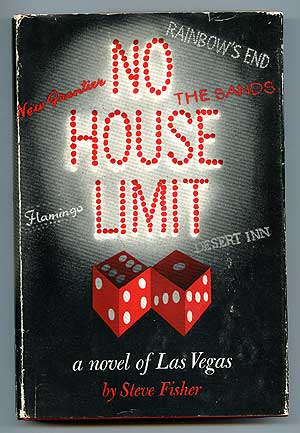

Fisher tries to play it both ways, as a typical pulp – Joe – and something a bit more emotive – Mal – which helps to keep the story moving along well, with a good exchange of terse dialogue and slightly more incisive stuff, but since the book truly belongs to a place and not its people, it’s hard to get too wrapped up in it.I’m a sucker for those old hard-boiled mystery/suspense books.

Yeah, that still sounds in line with how relationships in this genre were written back then, except Fisher inserts some juxtapositions: Martin’s trustworthy security man, Sprig, is questioning of the whole thing, and while we’re spending a good chunk of time with Joe sweating watching Bello, and amidst the Rainbow’s End’s clamor, another character – piano player Mal – starts to slowly come to the fore as a much more relatable human.īut No House Call, ultimately, is still a novel of Las Vegas, with a mixed feeling of winning and losing – some steps forward, some steps back – by story’s end. Their “romance” consists of her showing up, Joe saying nasty things to her and emotionally (and sometimes physically) assaulting her, and then, uh, love. Sure, we’re far removed from when this type of pairing of the young 20something and the abusive, sweary male was “cool,” but even going back to the time when this was written, I can’t see Joe as a dude we’re supposed to like, and Sunny is almost non-existent. The thing is, these two are not very interesting characters.

All of this is rather a good buffer for dealing with Joe himself, who’s a tuff, emotionless guy in the mold of all tuff, emotionless pulp guys in the 50s, who gets more and more strung out over a 3-day assault on his casino by Bello and these other events, while tempered by the cooing of the over-emotive, innocent schoolteacher Sunny, who is obviously also an incredible cliche. These blurbs are rather cold, and too complex or brief to really help explain anything, but that seems to be part of Fisher’s intent: when we’re on the floor of Martin’s “Rainbow’s End” casino, as he fends off attempts from the Syndicate to unsettle him – phony chips crooked dealers and primarily sending in hotshot gambler Bello – the stream of observations of the tables and showgirls and players is cut in with the slang chatter of people playing the games, tossing us in to the chaos and noise.

Chapters begin with quick runthroughs of how various games operate, or how things like vice are “handled” in Vegas, rather wholly separated from the narrative that then proceeds in the chapters. Steve Fisher’s “No House Limit” is tellingly subtitled: A Novel of Las Vegas it is not a book about characters, necessarily, or even about the Syndicate-vs.-independent-casino-owner Joe Martin premise it threads throughout its 200ish pages – it’s about Vegas – its hollowness its unbearable heat its soul-sucking qualities all built around chance and presented with glitter and plopped atop a desert.


 0 kommentar(er)
0 kommentar(er)
